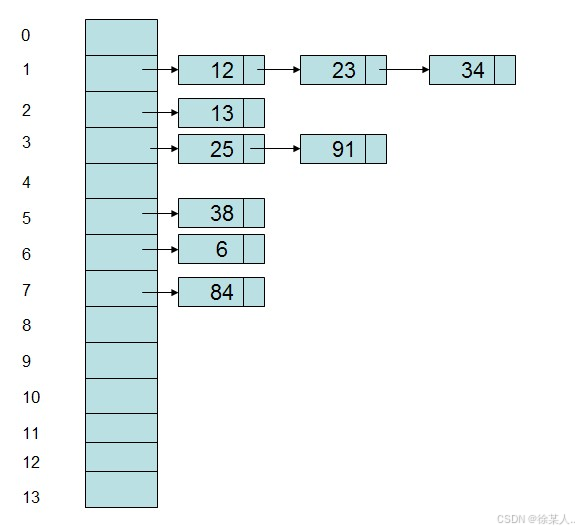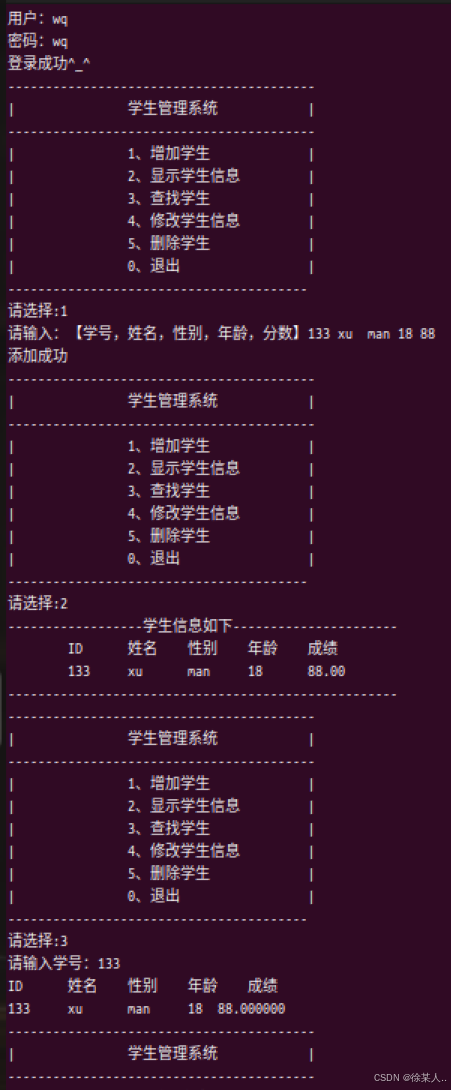--哈希表
-哈希表的概念
哈希表: 用散列法存储的线性表 被称为哈希表,使用的函数被称为散列函数或者哈希函数,f(k) 被称为散列地址或者哈希地址。。通常情况下,散列表的储存空间是一个一维数组,而哈希地址为数组的下标
-哈希表的基本思想
以节点的关键字k 为自变量,通过一个确定的函数关系f ,计算出对应的函数值,把这个函数值解释为节点的存储地址,将节点存储到f(k)所指示的的存储位置上,在查找时再根据要查找的关键字,用同样的函数计算地址,然后到对应的单元读取。
-哈希表的优点
顺序表的特点是:寻址容易 ,插入和删除困难
链表的特点是:寻址困难 ,插入和删除简单
哈希表则结合了俩者的特点,既寻址容易又插入和删除容易
-哈希冲突的解决方法
开放地址法
即当一个关键字和另一个关键字发生冲突时,使用某种探测技术在Hash表中形成 一个探测序列,然后沿着这个探测序列依次查找下去,当碰到一个空的单元时,则插入,比如有一组关键字{12,13,25,23,38,34,6,84,91},Hash表长为14,Hash函数为address(key)=key%11,当插入12,13,25时可以直接插入,而当插入23时,地址1被占用了,因此沿着地址1依次往下探测(探测步长可以根据情况而定),直到探测到地址4,发现为空,则将23插入其中。
链地址法
采用数组和链表相结合 的办法,将Hash地址相同的记录存储在一张线性表中,而每张表的表头的序号即为计算得到的Hash地址。如上述例子中,采用链地址法形成的Hash表存储表示为:

示例代码:学生管理系统
main.c
cs
#include "linkedlist.h"
void menu();
int main(){
while(!login_status){
login();
}
int select;
hash_t* hashtable=NULL;
// 创建hashtable
create_hashtable(&hashtable);
if(NULL == hashtable){
printf("hash table is NULL\n");
exit(EXIT_FAILURE);
}
do{
menu();
printf("请选择:");
scanf("%d",&select);
switch(select){
case 1:
insert_stu(hashtable);
break;
case 2:
show_stus(hashtable);
break;
case 3:
search_stu_by_id(hashtable);
break;
case 4:
modify_stu_by_id(hashtable);
break;
case 5:
del_stu_by_id(hashtable);
break;
case 0:
printf("欢迎下次光临!\n");
clear_hashtable(&hashtable);
exit(EXIT_SUCCESS);
case 6:
// show_stus_linkedlist(hashtable);
break;
}
}while(1);
}
void menu(){
printf("-----------------------------------------\n");
printf("|\t\t学生管理系统 |\n");
printf("-----------------------------------------\n");
printf("|\t\t1、增加学生 \t\t|\n");
printf("|\t\t2、显示学生信息 \t|\n");
printf("|\t\t3、查找学生 \t\t|\n");
printf("|\t\t4、修改学生信息 \t|\n");
printf("|\t\t5、删除学生 \t\t|\n");
printf("|\t\t0、退出 \t\t|\n");
printf("----------------------------------------\n");
}management.c
cs
#include "linkedlist.h"
bool login_status=false;
void login(){
printf("=============登录=============\n");
printf("用户:");
char uname[256]={0};
fgets(uname,sizeof(uname),stdin);
uname[strlen(uname)-1]='\0';
printf("密码:");
char password[256]={0};
fgets(password,sizeof(password)-1,stdin);
password[strlen(password)-1]='\0';
if(strcmp(uname,"wq")==0&&strcmp(password,"wq")==0){
printf("登录成功^_^\n");
login_status=true;
}else{
printf("用户或密码错误\n");
}
}
void create_hashtable(hash_t** hashtable){
hash_t* p_hash=(hash_t*)malloc(sizeof(hash_t));
if(NULL==p_hash){
printf("malloc failure\n");
return;
}
p_hash->n=0;
for(int i=0;i<SIZE;i++){
linkedlist_init(&(p_hash->item[i]));
}
*(hashtable)=p_hash;
}
uint32_t get_hashindex(char* id){
uint32_t hashcode=0;
while(*(id)!='\0'){
hashcode+=*(id);
id++;
}
return (uint32_t)(hashcode%SIZE);
}
void insert_stu(hash_t* hashtable){
datatype_t* stu=(datatype_t*)malloc(sizeof(datatype_t));
if(stu==NULL){
printf("malloc failure\n");
}
printf("请输入:【学号,姓名,性别,年龄,分数】");
scanf("%s %s %s %d %f",stu->id,stu->name,stu->gender,&(stu->age),&(stu->score));
uint32_t res=get_hashindex(stu->id);
linkedlist_insert_head(hashtable->item[res],stu);
if(res){
printf("添加成功\n");
}else{
printf("添加失败\n");
}
}
void show_stus(hash_t* p_hashtable){
printf("------------------学生信息如下----------------------\n");
printf("\tID\t姓名\t性别\t年龄\t成绩\t\n");
for(int i=0;i<SIZE;i++){
linkedlist_show(*(p_hashtable->item+i));
}
printf("----------------------------------------------------\n");
}
void search_stu_by_id(hash_t* hashtable){
printf("请输入学号:");
char id[128]={0};
while(getchar()!='\n');
fgets(id,sizeof(id)-1,stdin);
id[strlen(id)-1]='\0';
uint32_t index=get_hashindex(id);
search_data(hashtable->item[index],id);
}
void del_stu_by_id(hash_t* hashtable){
printf("请输入要删除的学生的学号:");
char id[128]={0};
while(getchar()!='\n');
fgets(id,sizeof(id)-1,stdin);
id[strlen(id)-1]='\0';
uint32_t index=get_hashindex(id);
bool res=linkedlist_remove_data(hashtable->item[index],id);
if(res){
printf("删除成功!\n");
}else{
printf("查无此人\n");
}
}
void modify_stu_by_id(hash_t* hashtable){
printf("请输入修改学生的ID:");
char id[128]={0};
while(getchar()!='\n');
fgets(id,sizeof(id)-1,stdin);
id[strlen(id)-1]='\0';
//根据ID获取哈希索引
uint32_t index=get_hashindex(id);
datatype_t* data=linkedlist_modify_stu(hashtable->item[index],id);
if(data!=NULL){
printf("修改学生信息成功");
printf("ID\t姓名\t性别\t年龄\t成绩\t\n");
printf("%s\t%s\t%s\t%d\t%.2f\t\n",data->id,data->name,data->gender,data->age,data->score);
}else{
printf("该%s对应学生不存在,修改学生信息失败\n",id);
}
}
void clear_hashtable(hash_t**p_hashtable){
linkednode_t** arr=(*p_hashtable)->item;
for(int i=0;i<SIZE;i++){
linkedlist_clear(*(arr+i));
}
free(*p_hashtable);
p_hashtable=NULL;
}management.h
cs
#ifndef __HEAD_MANAGEMENT_H__
#define __HEAD_MANAGEMENT_H__
#include <stdio.h>
#include <stdlib.h>
#include <string.h>
#include <stdint.h>
#include <errno.h>
#include <stdbool.h>
#include "linkedlist.h"
#define SIZE 13
typedef struct{
char id[128];
char name[128];
char gender[64];
uint32_t age;
float score;
}datatype_t;
typedef struct Node{
datatype_t* data;
struct Node* next;
}linkednode_t;
typedef struct {
linkednode_t* item[SIZE];
int n;
}hash_t;
// 登录状态
extern bool login_status;
extern void login();
extern void create_hashtable(hash_t**);
// 创建hash函数
extern uint32_t get_hashIndex(char*);
extern void insert_stu(hash_t*);
extern void show_stus(hash_t*);
extern void show_stus_linkedlist(hash_t*);
extern void search_stu_by_id(hash_t*);
extern void del_stu_by_id(hash_t*);
extern void modify_stu_by_id(hash_t*);
extern void clear_hashtable(hash_t**);
#endiflinkedlist.c
cs
#include "linkedlist.h"
void linkedlist_init(linkednode_t** p_dummyhead){
linkednode_t* p_node = (linkednode_t*)malloc(sizeof(linkednode_t));
if(p_node==NULL){
printf("malloc failure:%s\n",strerror(errno));
return;
}
memset(p_node,0,sizeof(linkednode_t));
p_node->next = NULL;
*p_dummyhead = p_node;
}
// 添加的方法
bool linkedlist_insert_head(linkednode_t* p_dummyhead,datatype_t* p_data){
//将data添加到链表的尾部
// 1、封装成节点
linkednode_t* p_node = (linkednode_t*)malloc(sizeof(linkednode_t));
if(p_node==NULL){
printf("malloc failure:%s\n",strerror(errno));
return false;
}
memset(p_node,0,sizeof(linkednode_t));
p_node->data = p_data;
p_node->next = NULL;
// 进行挂接
p_node->next = p_dummyhead->next;
p_dummyhead->next = p_node;
return true;
}
bool linkedlist_is_empty(linkednode_t* p_dummyhead){
return p_dummyhead == NULL || p_dummyhead->next==NULL;
}
bool linkedlist_remove_data(linkednode_t* p_dummyhead,const char* id){
if(linkedlist_is_empty(p_dummyhead)){
return false;
}else{
// 查找数据是否存在
linkednode_t* pre = p_dummyhead;
while(pre->next!=NULL){
if(strcmp(id,pre->next->data->id)==0){
linkednode_t* delnode = pre->next;
pre->next = pre->next->next;
free(delnode);
delnode=NULL;
return true;
}
pre=pre->next;
}
return false;
}
}
void linkedlist_show(linkednode_t* p_dummyhead){
linkednode_t* cur=p_dummyhead->next;
while(cur!=NULL){
printf("\t%s\t%s\t%s\t%d\t%.2f\n",cur->data->id,cur->data->name,cur->data->gender,cur->data->age,cur->data->score);
cur= cur->next;
}
}
void linkedlist_display(linkednode_t* p_dummyhead){
linkednode_t* cur= p_dummyhead->next;
while(cur!=NULL){
printf("%s--->",cur->data->id);
cur=cur->next;
}
printf("NULL\n");
}
void search_data(linkednode_t* dummyhead,const char* id){
if(dummyhead->next==NULL){
printf("查无此人!\n");
return;
}
linkednode_t* cur=dummyhead->next;
while(cur != NULL){
if(strcmp(cur->data->id,id) == 0){
printf("ID\t姓名\t性别\t年龄\t成绩\t\n");
printf("%-8s%-8s%-8s%-4d%-4f\n",cur->data->id,cur->data->name,cur->data->gender,cur->data->age,cur->data->score);
return;
}
cur = cur->next;
}
if(cur == NULL){
printf("找不到此人\n");
return;
}
}
datatype_t* linkedlist_modify_stu(linkednode_t* p_dummyhead,const char* id){
linkednode_t* cur=p_dummyhead->next;
while(cur!=NULL){
if(strcmp(cur->data->id,id)==0){
printf("---------------修改学生信息------------------\n");
printf("\t1.姓名\n");
printf("\t2.性别\n");
printf("\t3.年龄\n");
printf("\t4.分数\n");
printf("\t0.退出\n");
printf("请选择:");
int select;
datatype_t* stu=cur->data;
scanf("%d",&select);
switch(select){
case 1:
while(getchar()!='\n');
printf("姓名:");
fgets(stu->name,sizeof(stu->name)-1,stdin);
stu->name[strlen(stu->name)-1]='\0';
break;
case 2:
while(getchar()!='\n');
printf("性别:");
fgets(stu->gender,sizeof(stu->gender)-1,stdin);
stu->gender[strlen(stu->gender)-1]='\0';
break;
case 3:
printf("年龄:");
scanf("%d",&(stu->age));
break;
case 4:
printf("成绩:");
scanf("%f",&(stu->score));
break;
case 0:
break;
}
return stu;
}
cur=cur->next;
}
return NULL;
}
void linkedlist_clear(linkednode_t* p_dummyhead){
linkednode_t* pre=p_dummyhead;
while(pre->next!=NULL){
linkednode_t* del=pre->next;
pre->next=pre->next->next;
free(del);
del=NULL;
}
free(p_dummyhead);
p_dummyhead=NULL;
}linkedlist.h
cs
#ifndef __HEAD_LINKED_LIST_H__
#define __HEAD_LINKED_LIST_H__
#include <stdio.h>
#include <stdlib.h>
#include <string.h>
#include <stdint.h>
#in#clude <stdbool.h>
#include <errno.h>
#include "management.h"
extern bool linkedlist_insert_head(linkednode_t*, datatype_t*);
extern void linkedlist_init(linkednode_t**);
extern bool linkedlist_is_empty(linkednode_t*);
extern bool linkedlist_remove_data(linkednode_t*,const char*);
extern void linkedlist_show(linkednode_t*);
extern void linkedlist_display(linkednode_t*);
extern void search_data(linkednode_t*,const char*);
extern void del_data(linkednode_t*,const char*);
extern datatype_t*linkedlist_modify_stu(linkednode_t*,const char*);
extern void linkedlist_clear(linkednode_t*);
#endif输出结果
